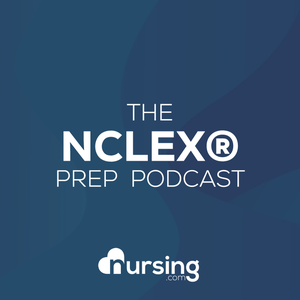
The Unofficial NCLEX® Prep Podcast by NURSING.com (NRSNG)
Jon Haws RN Nursing School Mentor and Kati Kleber RN CCRN Nursing Podcast Host with NRSNG
The Complete (Unofficial) NCLEX® Prep Podcast for Nursing Students by NURSING.com
- 14 minutes 15 secondsArterial Blood Gas Interpretation | How I Learned ABGsFor resources to help you master ABGs and ALL the LabVales, we have a FREE Cheatsheet Download at NURSING.com/LabValues. At NURSING.com you can learn everything you need to know as a nurse about ABGs including gas exchange, acidosis, alkalosis (metabolic and respiratory), normal lab value ranges, and more. We also cover key concepts for NCLEX for arterial blood gases. Our gas exchange nursing care plan covers impaired gas exchange nursing management, impaired gas exchange interventions, impaired gas exchange diagnosis, etc. Excerpt:
This patient’s lungs were so bad, gas exchange had to take place outside of his body... Learning to read ABGs, and understanding what to do with that information is a very important skill for any nurse, but particularly a cardiovascular ICU nurse.
Hi I am Nurse Abby, and I loved working in the cardiovascular ICU - that was truly one of my favorite nursing jobs. Today I want to share with you the story of one of my MORE complicated patients.
23 April 2024, 7:45 am - 7 minutes 18 secondsWhat I Wish I Knew | My Patient With Distributive ShockFor resources to help you master Cardiac topics, we have a FREE Cheatsheet Download at NURSING.com/heart. At NURSING.com you can learn everything you need to know as a nurse about distributive shock including distributive shock pathophysiology, distributive shock definition, types of distributive shock, and more. We also cover key concepts for NCLEX on distributive shock nursing. Our distributive shock nursing care plan covers distributive shock nursing management, distributive shock interventions, distributive shock diagnosis, etc. Excerpt:
This week I opened up some old nursing school notes, and I started remembering how hard nursing school really was!
I remember, in particular, getting a little confused between the different types of shock.
When I was studying distributive shock I found one key 🔑 point that actually cleared up a lot of the misunderstandings and confusion. That started to really turn things around for me in nursing school!
16 April 2024, 7:26 am - 20 minutes 48 secondsWhat I Wish I Knew | Coronary Artery Disease CAD for NursesFor resources to help you master Cardiac topics, we have a FREE Cheatsheet Download at NURSING.com/heart. At NURSING.com you can learn everything you need to know as a nurse about coronary artery disease including coronary artery disease pathophysiology, coronary artery disease symptoms, coronary artery disease treatment, and more. We also cover key concepts for NCLEX on coronary artery disease nursing. Our coronary artery disease nursing care plan covers coronary artery disease nursing management, coronary artery disease interventions, coronary artery disease diagnosis, etc. Excerpt: "One afternoon I got a phone call from Todd - our content director here at NURSING.com.
Hey man, so uh, just letting you know that I’m at the hospital being admitted. I’m having a heart attack, so I probably won’t be in tomorrow."
9 April 2024, 6:52 am - 4 minutes 36 secondsWhat I Wish I Knew | My Patient with Heart Failure (CHF)
For resources to help you master Cardiac topics we have a FREE Cheatsheet Download at NURSING.com/heart. At NURSING.com you can learn everything you need to know as a nurse about heart failure (CHF) including: heart failure pathophysiology, heart failure pharmacology (heart failure medications), heart failure symptoms heart failure treatment, and more. We also cover key concepts for NCLEX for heart failure nursing. Excerpt: "So let me tell you about this patient of mine. They had just come out of heart surgery for what is referred to as the ROSS Procedure. Part of this procedure requires the surgeon to reattach the coronary arteries to the aorta. While reattaching them, they were accidentally sutured closed. "2 April 2024, 7:47 am - 7 minutes 40 secondsWhat I Wish I Knew | My Patient With AnginaFor resources to help you master Cardiac topics we have a FREE Cheatsheet Download at NURSING.com/heart. At NURSING.com you can learn everything you need to know as a nurse about agina including: angina symptoms, anginal pharmacology, the difference between stable and unstable angina, and more. We also cover key concepts for NCLEX for angina nursing. Excerpt: ". . . it wasn't my patient that I should have been worried about
When my patient's son said he wasn't feeling right, it would have been easy to assume it was because of the stress he was under.
He was visiting his sick mom . . . in the ICU nonetheless.
But something just didn’t feel right"
26 March 2024, 7:53 am - 12 minutes 36 secondsVoices For The Voiceless | What It Means To Become An ICU Nurse
ICU Nurses- Voices for the Voiceless For more on cardiac care to help you in nursing school visit
Roughly 1 out of every 3 patients in the Intensive Care Unit, on average, are unable to communicate. Because of this, the role of an ICU nurse stretches far beyond providing medical care alone, but also acting as an advocate, or a voice for the voiceless to ensure that these patient’s needs, rights, and wishes are heard, recognized and respected. In doing so, these warriors in scrubs essentially embody the very essence of healthcare: compassion, advocacy, and unwavering commitment to patient welfare.
Welcome to the NURSING Family, we call it the most supportive nursing cohort on the planet. At NURSING.com, we want to help you save time in nursing school as we take you from discouraged and stressed to motivated and passionate with clear and concise, must-know information to help you pass your tests and improve your grades, so that you can focus on becoming an amazing nurse. YOU CAN DO THIS! Check out our freebies and learn more at: (www.nursing.com)
19 March 2024, 7:01 pm - 10 minutes 39 secondsKeeping Up With The Carditises- Heart Inflammation
For more Carditis and the heart just visit NURSING.com/heart.
Did you know that the average human heart beats 100,000 times a day, pumping 2,000 gallons of blood?
Now, imagine if this vital pump was under threat from, pericarditis, myocarditis, or endocarditis and couldn’t pump effectively.
In this episode we will look at the importance of understanding carditis and an easy way that I used in nursing school to remember the area affected by each type; then, run through a quick scenario at the end to apply what we have learned.
12 March 2024, 8:34 am - 4 minutes 56 secondsI'm not smart enough to be a nurse . . . yet
Ever notice why some students embrace challenges, while others shy away?
Mindsets.
Your mindset might just change how you approach your goals in nursing school…
A fixed mindset: abilities are set.
A growth mindset: abilities develop.
-
When challenges appear, your mindsets matter.
In nursing school, challenges are constant.
-
A student with a fixed mindset avoids challenges.
-
One with a growth mindset thrives when challenges arise.
Having a growth mindset is the secret sauce for success.
Putting effort into a fixed mindset is useless. It's time to shift your thinking.
When considering success and failure, success in a fixed mindset is about validation, but in a growth mindset, it's about learning. Failure isn't a setback; it's an opportunity for growth.
As a nursing student, adopt a growth mindset: see challenges as learning opportunities, embrace mistakes, and persist. Grow your knowledge and expand your growth mindset with NURSING.com.
5 March 2024, 8:42 am -
- 6 minutes 6 secondsINSULIN . . . Life Saver or Life Taker | Understanding How Insulin Works
Does insulin save lives, or does it take lives?
Bodies that don’t produce enough insulin shut down, but if too much insulin is in the system it can be just as disastrous. As nurses, we are often tasked with administering insulin to our patients. When done incorrectly it can be life-threatening. For years I was a member of the code team, and count
- WHEN I was a new nurse I remember trying to keep track of the patients and insulin action times and the dosage times and everything else . . . I felt like I was drowning trying to keep it all straight in my head - I was both stressed and scared at the same time
- THAT’S WHEN I copied all the insulin peak and onset times down in my notebook.
- THIS HELPED me feel more relaxed and avoid my patient coding!
If you want to see my notes they are at NURSING.com/cheatsheets.
Honestly, I still use the cheatsheet today!
What we cover in this episode:
- what is insulin
- understanding how insulin works
- what does insulin do
- types of insulin
- onset, peak, duration of insulin
27 February 2024, 8:02 am - 11 minutes 38 secondsNursing Prioritization and ABCs | How I Almost Killed My Patient
I almost killed my patient.
In the days after my scary event I spent hours and hours thinking through what I had done.
I knew my ABCs, I had prioritized everything I was supposed to, how could things have gone so horribly wrong…
See our full lesson on Prioritization at NURSING.com.
And I realized that I had overlooked a very important part of my ABCs.
It wasn’t the A - airway, the B - breathing, or the C - circulation
What was left, what did I miss?
What I violated was Safety.
That small little “s” at the end of my ABCs - Safety
And I learned 3 Crucial Take-Aways
-
ABCs are Priorities not Checklists!
-
Don't be complacent about the s for Safety
-
Ask for help as soon as possible
See our full lesson on Prioritization at NURSING.com.
20 February 2024, 9:14 pm -
- 10 minutes 16 seconds"i don't know . . ."
Them: "How can we help?"
Me: "I don't know . . ."
This is a conversation I've had countless times over the last year. If only I had some sort of ailment that could be SEEN and FIXED . . . why can't it be a broken arm? A simple cast would "fix" the problem in just a matter of weeks.
With mental health, you read the books, you do the checklists, you take the meds, you attend counseling . . . but at any moment . . . around any corner . . . there it is - ready to crush your hope and happiness.
Each time you start a new medication you feel hopeful . . . "this time it will work"
And each time a new medication doesn't help, you feel a bit more hopeless . . . "maybe I am beyond repair"
They say mental health is a battle. It is.
And for many of us it is a lifelong battle.
And worse still, it is a silent battle - no one can SEE what you are going through.
And the worst part is that you begin to convince yourself that it has to be silent - that you shouldn't share your struggle - that perhaps you are "beyond repair" - that others will judge.
15 February 2024, 9:35 am - More Episodes? Get the App
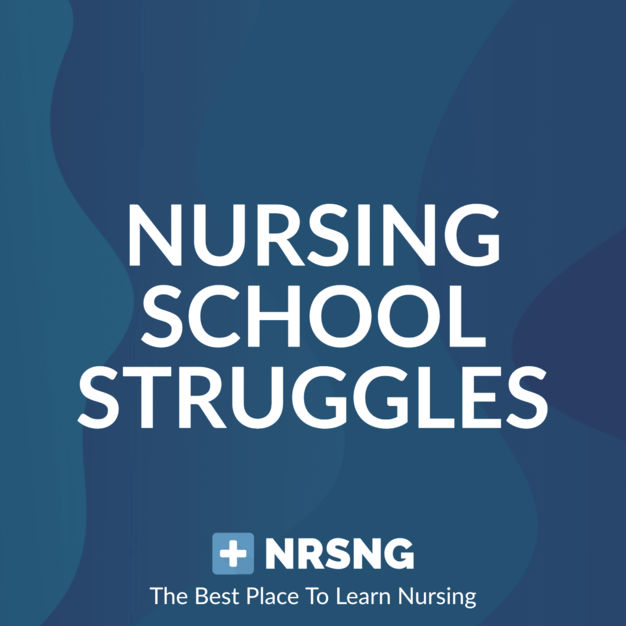 Nursing School Struggles by NRSNG
Nursing School Struggles by NRSNG
 Lab Values Podcast by NURSING.com (Nursing Podcast, normal lab values for nurses for NCLEX®) by NURSING.com (NRSNG)
Lab Values Podcast by NURSING.com (Nursing Podcast, normal lab values for nurses for NCLEX®) by NURSING.com (NRSNG)
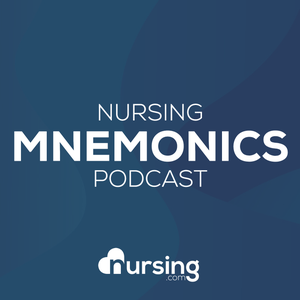 Nursing Mnemonics Show by NURSING.com (NRSNG) (Memory Tricks for Nursing School)
Nursing Mnemonics Show by NURSING.com (NRSNG) (Memory Tricks for Nursing School)
 EKG Interpretation (How to Interpret ECGs) by NURSING.com (NRSNG)
EKG Interpretation (How to Interpret ECGs) by NURSING.com (NRSNG)
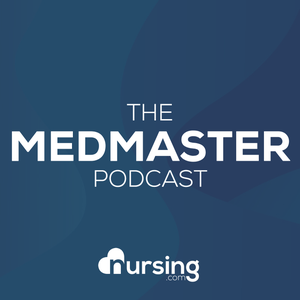 MedMaster by NURSING.com
MedMaster by NURSING.com
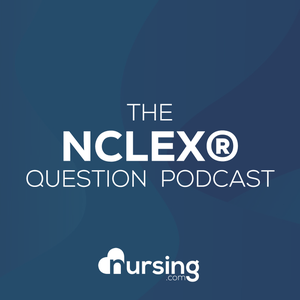 NURSING.com NCLEX® Question of the Day (Nursing Podcast for NCLEX® Prep and Nursing School) by NURSING.com (NRSNG)
NURSING.com NCLEX® Question of the Day (Nursing Podcast for NCLEX® Prep and Nursing School) by NURSING.com (NRSNG)
Your feedback is valuable to us. Should you encounter any bugs, glitches, lack of functionality or other problems, please email us on [email protected] or join Moon.FM Telegram Group where you can talk directly to the dev team who are happy to answer any queries.